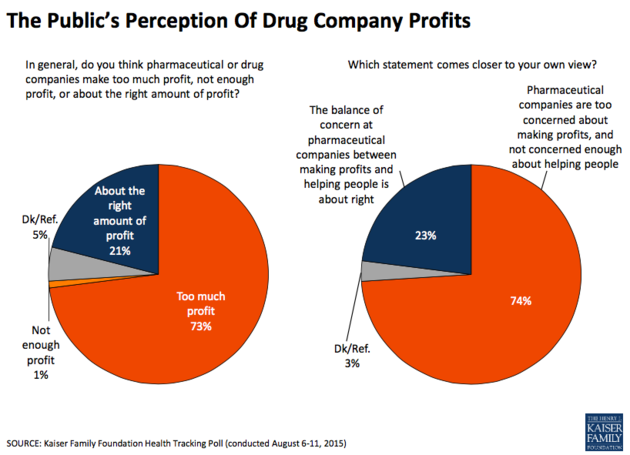Americans pay more for prescription drugs than the rest of the world, and we’ve noticed.
By Jeffrey Young
The Huffington Post, August 20, 2015
WASHINGTON — Americans use prescription drugs and they know these medicines help people, but they still don’t care much for pharmaceutical companies and think the industry is too money-hungry, according to a new survey.
More than seven in 10 Americans think prescription drug prices are unreasonable, the Henry J. Kaiser Family Foundation reported Thursday. And nearly eight in 10 people who actually take those drugs feel the same way.
Almost three-quarters also correctly observed that Americans tend to pay higher prices than people in other countries, where governments typically control prices directly.

And though the survey indicates that most people have health insurance that allows them to afford these medicines — meaning Big Pharma isn’t about to see its sales numbers shrink — it also shows sincere dissatisfaction with drug companies and the amount of money they charge for their products.
Some positive findings for pharmaceutical companies: 62 percent of those surveyed agreed that prescription drugs are good for people.
And that’s about all the good news the Kaiser Family Foundation has for the industry.
Just 42 percent of Americans have a favorable opinion of drug companies. That makes them slightly more popular than oil companies, and less popular than the rest of the health care system — including health insurers — airlines and banks.

And in spite of a long-running public relations campaign focused on drug companies’ contributions to America, survey respondents don’t seem to think Big Pharma is anything special: 57 percent said pharmaceutical companies are doing about as much for society as those in other industries.
Possibly related to all of this is that the public overwhelmingly believes drug companies make too much money, and care more about profits than the patients for whom they make their medicines.

The pharmaceutical industry is only now entering an era where drugs that cost $1,000 a pill are becoming less rare, and the public, doctors, the health care industry and policy makers are taking notice. Rising drug costs are a big reason why national health care spending began slowing down at a faster rate last year after a stretch of historically low growth. Health insurance companies, employers that provide health coverage to workers and state governments are seeking new ways to squeeze down their expenses on medicines.
And the 2016 presidential campaign could elevate drug prices to a big political issue after Obamacare has dominated the health care debate for years. On the presidential campaign trail, former Secretary of State Hillary Clinton has been talking up proposals to reduce pharmaceutical costs, such as relaxing a federal law prohibiting Medicare from setting drug prices like it does for doctor and hospital fees.
According to the Kaiser Family Foundation survey, the public might be open to greater government intervention in the prescription drug market. Asked generally, a slim majority of respondents favored “competition in the marketplace” to “regulation by the federal government.”
But when asked what specific solutions to high drug costs America should employ, and which ones would work, people seem to favor more government intervention. More than 80 percent, for example, support Medicare negotiating drug prices, and large majorities back establishing legal limits on how much pharmaceutical manufacturers can charge and allowing Americans to buy lower-priced medicines from Canada.

